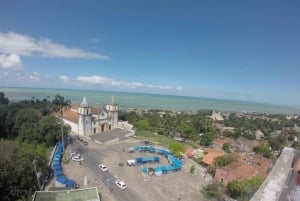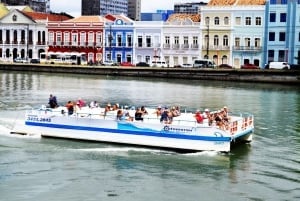Money and Banking in Brazil
Brazil’s currency is the "Real" and was introduced in 1994 (the leading 'R' in Portuguese is pronounced as an "H" sound) and has been very stable for some years. The regular changes of currencies and hyperinflation of the '80's and early '90's have long gone, and annual inflation in 2012/13 is running at around 6%.
The plural is Reais, the symbol R$ or the currency exchange symbol is shown as (BRL), and 100 Centavos make up R$1. Whilst the note denominations are similar to £, US$ or Euro (€ - EUR), you will notice Brazilians use a comma (,) where North Americans and Europeans would use a full-stop (.) – US$ 5,422.50 would appear as R$ 5.422,50 in Recife.



| Paper Notes | Coins |
| Real / Reais | Centavo / Centavos |
| R$ 1,00 Real * | 1 Centavo * |
| R$ 2,00 Reais | 5 Centavos |
| R$ 5,00 Reais | 10 Centavos |
| R$ 10,00 Reais | 25 Centavos |
| R$ 20,00 Reais | 50 Centavos |
| R$ 50,00 Reais | R$ 1,00 Real Coin |
| R$ 100,00 Reais | |
| * no longer produced | |
Currency withdrawals and Money transfers in Brazil:
In recent years, the Real has been fairly resistant to fluctuations and is increasingly recognised as a strong currency, and is becoming easier to source in reasonable quantities in large cities, airports and Bureau de Change around the world.
The Brazilian banking (branch and online) system is very modern and stable and often transactions are done in real-time. Many well known global brands such as HSBC, Santander and Citibank have branch networks in most cities in Brazil. If it is normal practice when you go abroad, always advise your bank and credit card operator that you are travelling to Brazil to avoid your card getting automatically blocked by their anti-fraud systems.
It is normally possible to withdraw cash from ATM's from abroad at most domestic bank branches (e.g. Banco do Brasil, Bradesco, HSBC, Santander), at airports or 24-hour cash-machines (e.g. Banco 24 Horas) in shopping centres and petrol stations. Take all the normal security procedures such as avoiding withdrawals late at night in deserted areas and ensuring noone is watching you.
There may be both daily and monthly limits to the amount of cash you can withdraw and transfer to/from Brazil during your stay. You should check with your bank. You should bring some US$, Euro and/or £ notes, travellers cheques and more than one option of credit or debit card, just in case.
Brazil is introducing new modern notes that are more difficult to forge and each denomination has a different note size. The "old" bills were all the same size. Examples can be seen to the right.
An interesting and pleasing feature of Brazilian bank notes are the native animals depicted on each denomination.
If you intend to transfer larger amounts to or from Brazil (e.g. buying or selling property) you will need to declare it with the Central Bank and should take good professional advice to avoid potential tax charges in the future and look at a number of options to get the best exchange rates.
You will need a Brazilian Tax (CPF) number to buy property and open a bank account (when you will need a relevant Visa also). If you do not have one, you should contact your nearest Brazilian Consulate or a professional advisor.
For further information, we strongly suggest you contract our preferred professional advisors, which will be listed in the Services sections of this site soon. In meantime, feel free to contact My Guide Recife's local experts by email or via our social media channels.











